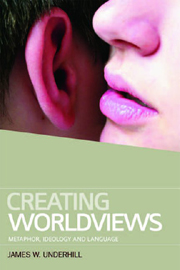Book contents
8 - Hitlerdeutsch: Klemperer and the Language of the Third Reich
from Part II - Case Studies in Metaphor
Published online by Cambridge University Press: 12 September 2012
Summary
MINDSET AND PERSONAL WORLD
In the last chapter we considered the way metaphor helped to shape and structure the worldview of Czech communists in the 1970s. We were, however, forced to accept that we were often dealing with three different kinds of worldview. The Czech language itself, as a network of concepts, conceptual links and linguistic habits, had been remodelled by the forces of the Marxist-Leninist worldview. This was by no means a one-way process: on the contrary, the concepts of ‘people’, ‘folk’ and ‘nation’ which were fundamental to the communist worldview were modelled using the plastic material of the Czech imagination, an imagination shaped by the revival of the Czech people, the fight for independence from the Austro-Hungarian Empire and the liberation of the Czech lands by the Soviets in 1945. Within the framework of this dynamic struggle between tradition, on the one hand, with its concepts for history, society and for progress, and the communist Weltanschauung, on the other, with its worldview-transforming concepts and political agenda, Czechs perceived and conceived the world around them. This world-perceiving and world-conceiving (which no Czech speakers could escape whether they resisted it or not) contributed to the construction of a shared organised worldview which over-arched the division into political camps. Dissent, opposition and political hostility, however antagonistic, however radical, all suppose a shared basis of fundamental concepts, principles, arguments and ideals, which form the basis and the framework for dialogue, dispute and the positioning of alternative philosophies.
- Type
- Chapter
- Information
- Creating WorldviewsMetaphor Ideology and Language, pp. 128 - 171Publisher: Edinburgh University PressPrint publication year: 2011

